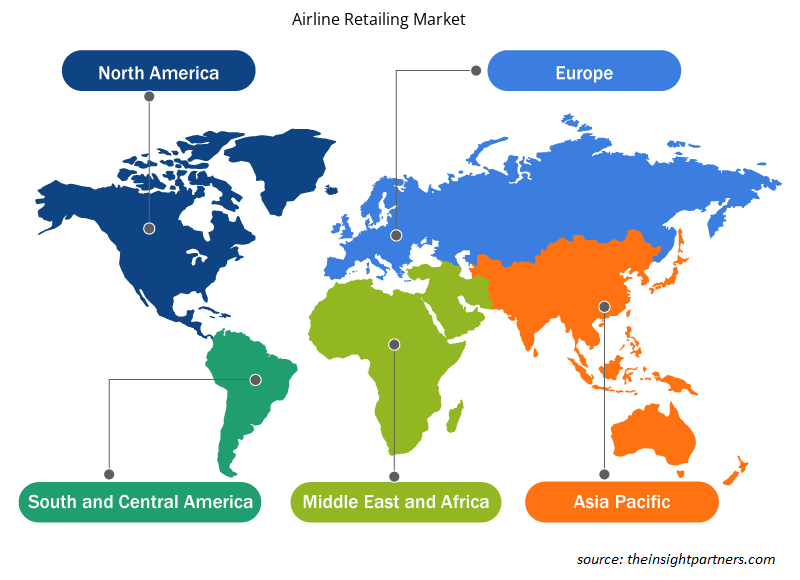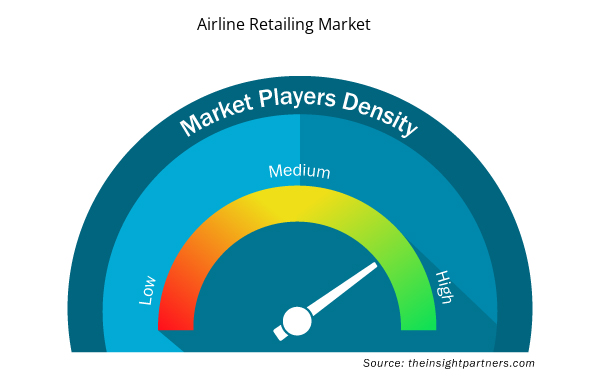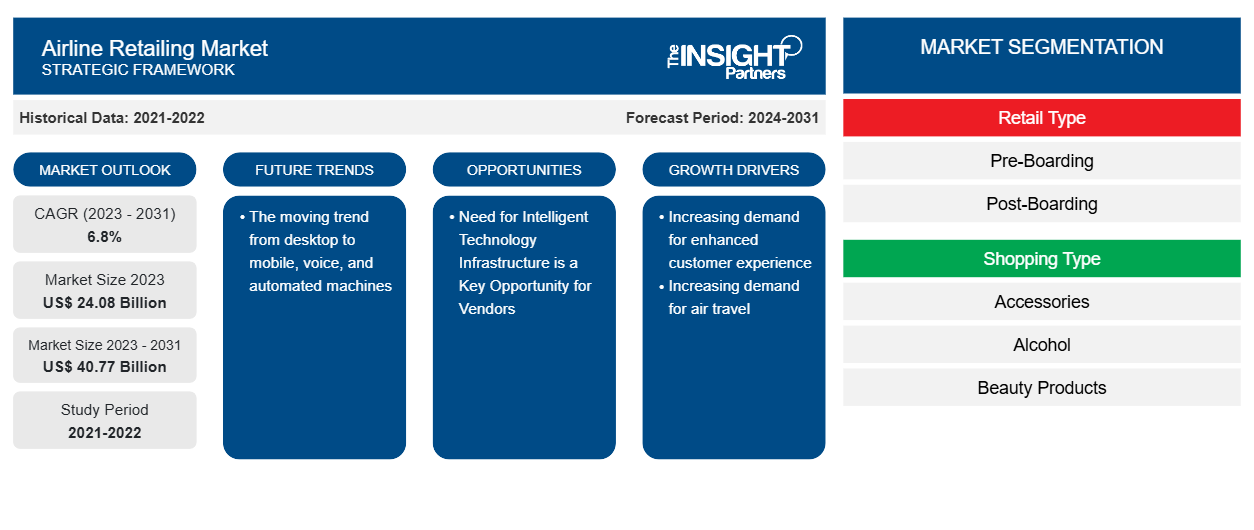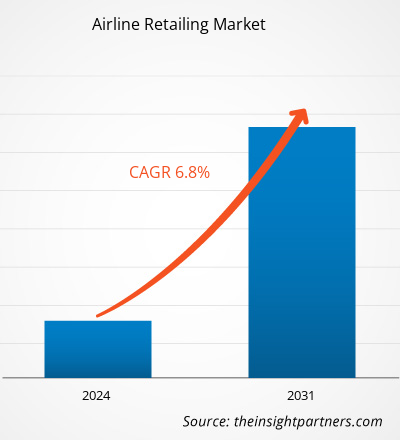航空零售市场规模预计将从 2023 年的 240.8 亿美元增至 2031 年的 407.7 亿美元。预计 2023-2031 年期间,市场复合年增长率将达到 6.8%。从台式机到移动设备、语音和自动化机器的转变趋势可能仍是市场的主要趋势。
航空零售市场分析
零售业正在推动旅行购买方式的转变。在更广泛的领域,零售商已经建立了先进的营销实践,以更好地服务客户。此外,航空公司也在探索新的旅行服务形式,为乘客增加价值并提高盈利能力。航空零售有助于提高航空公司收入,同时提高客户满意度。航空公司通过两种不同的模式提供零售服务,即登机前和登机后。一些航空公司提供这两种模式,但某些航空公司只提供上述模式之一。
航空零售市场概况
在目前的市场情况下,多家航空公司既提供登机前零售,也提供登机后零售。近年来,登机前销售部分占据了市场主导地位,预计未来几年也将推动航空零售市场的发展。这是因为一些航空公司正在终止其整个机队的飞行中商品销售选择。这导致对登机前部分的重视程度增加。各家航空公司都有自己的内部零售商,拥有大量的产品线。例如,新加坡航空的内部零售商 KrisShop Pte. Ltd. 提供各种香水、包、电子产品、手表、葡萄酒和烈酒等。同样,英国航空 High Life Shop 是英国航空的内部零售商,提供大量的产品线。没有内部零售商的各家航空公司都与零售商合作。
定制此报告以满足您的需求
您可以免费定制任何报告,包括本报告的部分内容、国家级分析、Excel 数据包,以及为初创企业和大学提供优惠和折扣
- 获取此报告的关键市场趋势。这个免费样品将包括数据分析,从市场趋势到估计和预测。
航空零售市场的驱动因素和机遇
对增强客户体验的需求不断增加
航空业是一个竞争激烈的市场。航空公司的运营成本非常高,而且需求受季节性波动的影响很大。随着航空公司数量的增加,企业正在寻找能够帮助航空公司在竞争激烈的市场中获得优势的替代方案。为了在市场中获得优势,航空公司高度注重提高服务质量,以提高客户满意度。
先进的技术和客户智能为改善客户体验创造了新的机会。客户智能的实施为航空零售创造了新的机会。航空公司拥有忠实的受众和广泛的客户知识,这些都得益于数字应用,可以利用情感动能通过智能和有趣的机上零售机会来激发这些受众和客户知识。大多数航空公司在零售机会方面都处于学习曲线上。通过招募具有零售经验的外部人才,航空公司正在提高其零售业绩。大数据的利用也影响着航空零售,并正在优化客户价值和体验。先进技术的引入和对增强客户体验的需求不断增长,极大地推动了航空零售市场的发展。
对智能技术基础设施的需求是供应商的关键机遇
为了在以客户为中心的环境中运营,航空公司正专注于实施智能零售解决方案,并正在创造对智能技术基础设施的潜在需求。智能技术基础设施结合了人工智能 (AI)、机器学习 (ML)、复杂的运筹学 (OR) 模型和客户数据,以提供相关见解。客户数据使航空公司能够识别、分析和预测消费者行为。
智能技术还使各部门能够同步安排,更快地部署航班时刻表以增加收入并降低推荐成本,自动监控和分析票价,提供基于个人的航班加辅助服务捆绑优惠,提供利用多渠道可用性且不受突然的市场变化影响的定价建议,并提供在所有渠道一致的个性化优惠和服务。
航空零售市场报告细分分析
有助于得出航空零售市场分析的关键部分是零售类型、购物类型和承运人类型。
- 根据零售类型,航空零售市场分为登机前和登机后。登机前部分在 2023 年占据了更大的市场份额。
- 根据购物类型,航空零售市场分为配件、酒类、美容产品、商品和其他。商品部分在 2023 年占据了更大的市场份额。
- 根据航空公司类型,航空零售市场分为全服务航空公司和低成本航空公司。全服务航空公司在 2023 年占据了更大的市场份额。
航空零售市场份额(按地区)分析
航空零售市场报告的地理范围主要分为五个地区:北美、欧洲、亚太、中东和非洲、南美。
2023 年,亚太地区占据了市场主导地位,其次是北美和欧洲地区。此外,亚太地区在未来几年也可能出现最高的复合年增长率。中国在 2023 年占据了亚太航空零售市场的主导地位。亚太地区包括一些增长最快的世界经济体,例如中国和印度。除此之外,日本是该地区技术最先进的国家,为在该地区部署物联网/智能解决方案提供了机会。此外,韩国、台湾、新加坡等亚洲新兴经济体的技术和智能趋势正在增长,从而推动了各种服务的增长。此外,亚太地区的发展中经济体在过去几年中经历了经济的指数级增长。这也导致了更高的就业率,以及个人可支配收入的增加。高可支配收入使这些国家的中产阶级和中上阶层人口能够享受飞机旅行等奢华服务。这些国家的乘机旅客数量显着增加。
航空零售市场区域洞察
Insight Partners 的分析师已详尽解释了预测期内影响航空零售市场的区域趋势和因素。本节还讨论了北美、欧洲、亚太地区、中东和非洲以及南美和中美洲的航空零售市场细分和地理位置。

- 获取航空零售市场的区域特定数据
航空零售市场报告范围
| 报告属性 | 细节 |
|---|---|
| 2023 年的市场规模 | 240.8亿美元 |
| 2031 年市场规模 | 407.7 亿美元 |
| 全球复合年增长率(2023 - 2031) | 6.8% |
| 史料 | 2021-2022 |
| 预测期 | 2024-2031 |
| 涵盖的领域 | 按零售类型
|
| 覆盖地区和国家 | 北美
|
| 市场领导者和主要公司简介 |
|
航空零售市场参与者密度:了解其对业务动态的影响
航空零售市场正在快速增长,这得益于消费者偏好的不断变化、技术进步以及对产品优势的认识不断提高等因素导致的终端用户需求不断增加。随着需求的增加,企业正在扩大其产品范围,进行创新以满足消费者的需求,并利用新兴趋势,从而进一步推动市场增长。
市场参与者密度是指在特定市场或行业内运营的企业或公司的分布情况。它表明在给定市场空间中,相对于其规模或总市场价值,有多少竞争对手(市场参与者)存在。
在航空零售市场运营的主要公司有:
- 法航/荷航
- 亚洲航空集团有限公司
- 英国航空公司
- 德国汉莎航空
- 易捷航空
- 大韩航空有限公司
免责声明:上面列出的公司没有按照任何特定顺序排列。

- 获取航空零售市场顶级关键参与者概览
航空零售市场新闻及最新发展
航空零售市场通过收集一手和二手研究后的定性和定量数据进行评估,其中包括重要的公司出版物、协会数据和数据库。以下列出了航空零售市场的一些发展情况:
- 英国航空位于盖特威克机场的短途子公司 BA Euroflyer 扩大了 Euro Traveller(经济舱)可供乘客购买的选项,并在 Club Europe(商务舱)推出了新的季节性菜单。该航空公司与其零售合作伙伴 Tourvest 合作,通过为乘客在飞行期间提供新的购买选项,扩大了其机上服务。此前,乘客只能预订新鲜食品,或在旅途中购买零食。新的客户选择包括新鲜的 Tom Kerridge Chicken Coronation 三明治和 Sweet & Spicy Falafel 卷饼,无需预订即可在机上购买。客户可以将其与 Jimmy's 冰咖啡或 Punchy 软饮料搭配。(来源:英国航空,新闻稿,2023 年 4 月)
- 卡塔尔航空推出机上新菜单,食材均来自卡塔尔当地有机农场。从多哈出发的乘客可享受该航空公司的最新美味,有效期至 2024 年 3 月。(来源:卡塔尔航空,新闻稿,2023 年 11 月)
航空零售市场报告覆盖范围和交付成果
“航空零售市场规模和预测(2021-2031)”报告对市场进行了详细的分析,涵盖以下领域:
- 航空零售市场规模及全球、地区和国家层面所有主要细分市场的预测
- 航空零售市场趋势以及市场动态,如驱动因素、限制因素和关键机遇
- 详细的波特五力分析
- 航空零售市场分析涵盖主要市场趋势、全球和区域框架、主要参与者、法规和最新市场发展
- 行业格局和竞争分析,涵盖市场集中度、热点图分析、知名参与者以及航空零售市场的最新发展
- 详细的公司简介
- 历史分析(2 年)、基准年、预测(7 年)及复合年增长率
- PEST 和 SWOT 分析
- 市场规模价值/数量 - 全球、区域、国家
- 行业和竞争格局
- Excel 数据集



Report Coverage
Revenue forecast, Company Analysis, Industry landscape, Growth factors, and Trends

Segment Covered
This text is related
to segments covered.

Regional Scope
North America, Europe, Asia Pacific, Middle East & Africa, South & Central America

Country Scope
This text is related
to country scope.
常见问题
Asia Pacific region dominated the airline retailing market in 2023.
Increasing demand for enhanced customer experience and increasing demand for air travel are some of the factors driving the growth for airline retailing market.
The moving trend from desktop to mobile, voice, and automated machines is one of the major trends of the market.
Air Asia Group, Air France – KLM SA, British Airways Plc, easyJet Plc, Korean Air Lines Co Ltd, Duetsche Lufthansa AG Qantas Airways Limited Singapore Airline Limited Thai Airways International Public Co Ltd, and The Emirates Group are some of the key players profiled under the report.
The estimated value of the airline retailing market by 2031 would be around US$ 40.77 billion.
Trends and growth analysis reports related to Aerospace and Defense : READ MORE..
The Insight Partners performs research in 4 major stages: Data Collection & Secondary Research, Primary Research, Data Analysis and Data Triangulation & Final Review.
- Data Collection and Secondary Research:
As a market research and consulting firm operating from a decade, we have published and advised several client across the globe. First step for any study will start with an assessment of currently available data and insights from existing reports. Further, historical and current market information is collected from Investor Presentations, Annual Reports, SEC Filings, etc., and other information related to company’s performance and market positioning are gathered from Paid Databases (Factiva, Hoovers, and Reuters) and various other publications available in public domain.
Several associations trade associates, technical forums, institutes, societies and organization are accessed to gain technical as well as market related insights through their publications such as research papers, blogs and press releases related to the studies are referred to get cues about the market. Further, white papers, journals, magazines, and other news articles published in last 3 years are scrutinized and analyzed to understand the current market trends.
- Primary Research:
The primarily interview analysis comprise of data obtained from industry participants interview and answers to survey questions gathered by in-house primary team.
For primary research, interviews are conducted with industry experts/CEOs/Marketing Managers/VPs/Subject Matter Experts from both demand and supply side to get a 360-degree view of the market. The primary team conducts several interviews based on the complexity of the markets to understand the various market trends and dynamics which makes research more credible and precise.
A typical research interview fulfils the following functions:
- Provides first-hand information on the market size, market trends, growth trends, competitive landscape, and outlook
- Validates and strengthens in-house secondary research findings
- Develops the analysis team’s expertise and market understanding
Primary research involves email interactions and telephone interviews for each market, category, segment, and sub-segment across geographies. The participants who typically take part in such a process include, but are not limited to:
- Industry participants: VPs, business development managers, market intelligence managers and national sales managers
- Outside experts: Valuation experts, research analysts and key opinion leaders specializing in the electronics and semiconductor industry.
Below is the breakup of our primary respondents by company, designation, and region:

Once we receive the confirmation from primary research sources or primary respondents, we finalize the base year market estimation and forecast the data as per the macroeconomic and microeconomic factors assessed during data collection.
- Data Analysis:
Once data is validated through both secondary as well as primary respondents, we finalize the market estimations by hypothesis formulation and factor analysis at regional and country level.
- Macro-Economic Factor Analysis:
We analyse macroeconomic indicators such the gross domestic product (GDP), increase in the demand for goods and services across industries, technological advancement, regional economic growth, governmental policies, the influence of COVID-19, PEST analysis, and other aspects. This analysis aids in setting benchmarks for various nations/regions and approximating market splits. Additionally, the general trend of the aforementioned components aid in determining the market's development possibilities.
- Country Level Data:
Various factors that are especially aligned to the country are taken into account to determine the market size for a certain area and country, including the presence of vendors, such as headquarters and offices, the country's GDP, demand patterns, and industry growth. To comprehend the market dynamics for the nation, a number of growth variables, inhibitors, application areas, and current market trends are researched. The aforementioned elements aid in determining the country's overall market's growth potential.
- Company Profile:
The “Table of Contents” is formulated by listing and analyzing more than 25 - 30 companies operating in the market ecosystem across geographies. However, we profile only 10 companies as a standard practice in our syndicate reports. These 10 companies comprise leading, emerging, and regional players. Nonetheless, our analysis is not restricted to the 10 listed companies, we also analyze other companies present in the market to develop a holistic view and understand the prevailing trends. The “Company Profiles” section in the report covers key facts, business description, products & services, financial information, SWOT analysis, and key developments. The financial information presented is extracted from the annual reports and official documents of the publicly listed companies. Upon collecting the information for the sections of respective companies, we verify them via various primary sources and then compile the data in respective company profiles. The company level information helps us in deriving the base number as well as in forecasting the market size.
- Developing Base Number:
Aggregation of sales statistics (2020-2022) and macro-economic factor, and other secondary and primary research insights are utilized to arrive at base number and related market shares for 2022. The data gaps are identified in this step and relevant market data is analyzed, collected from paid primary interviews or databases. On finalizing the base year market size, forecasts are developed on the basis of macro-economic, industry and market growth factors and company level analysis.
- Data Triangulation and Final Review:
The market findings and base year market size calculations are validated from supply as well as demand side. Demand side validations are based on macro-economic factor analysis and benchmarks for respective regions and countries. In case of supply side validations, revenues of major companies are estimated (in case not available) based on industry benchmark, approximate number of employees, product portfolio, and primary interviews revenues are gathered. Further revenue from target product/service segment is assessed to avoid overshooting of market statistics. In case of heavy deviations between supply and demand side values, all thes steps are repeated to achieve synchronization.
We follow an iterative model, wherein we share our research findings with Subject Matter Experts (SME’s) and Key Opinion Leaders (KOLs) until consensus view of the market is not formulated – this model negates any drastic deviation in the opinions of experts. Only validated and universally acceptable research findings are quoted in our reports.
We have important check points that we use to validate our research findings – which we call – data triangulation, where we validate the information, we generate from secondary sources with primary interviews and then we re-validate with our internal data bases and Subject matter experts. This comprehensive model enables us to deliver high quality, reliable data in shortest possible time.


 获取此报告的免费样本
获取此报告的免费样本